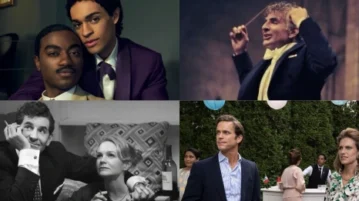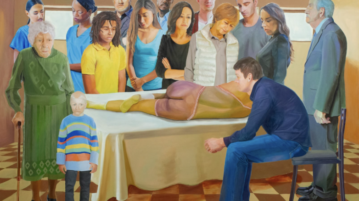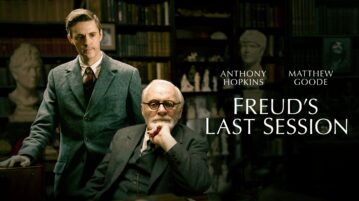Blog
Trans Joy Onstage Deep in the Heart of Texas
By Brian Fehler
This spring, Ground Floor Theatre in Austin presented the world premiere of Always a Boy, by mother-son playwrights Jo and Jeremy Ivester. The play, which addresses the family dynamics of having a trans son, had its world premiere deep in the heart of Texas.
The Rituals of Revival
By Sarah Drepaul
This is what distinguishes the festival from other queer art performances, at least in the U.S.: it is not afraid to understand and showcase queerness in all the ways it impacts us.
Queerbaiting History: Maestro and Fellow Travelers (Part Two)
By Jonathan Alexander
I didn’t realize at first that this series, especially when seen alongside Maestro, actually epitomizes queerbaiting: it titillates with the specter of gay sex while ultimately punishing the faggots.
Queerbaiting History: Maestro and Fellow Travelers (Part One)
By Jonathan Alexander
Both of these shows also offer us portraits of queer life and love amidst the homophobia of the mid to late twentieth century. But as I watched and thought about the film and series, I came to feel more and more…baited — queerbaited by the representation of our own history.
Companionship & Transformation: Linus Borgo
By Cassandra Langer
“Visceral and shocking to many, Linus Borgo’s first solo show, Monstrum, at Yossi Milo Gallery on Tenth Avenue in the trendy, Chelsea art district of NYC, seeks to awaken and educate viewers on what one is willing to sacrifice to feel at home in their body.”
Bruno Isaković: Performer, Artist, Teacher
By Mike Dressel
It’s an hour before the Queer New York International Arts Festival (QNYIAF) is about to begin, which brings together an assortment of global artists to explore queerness through art. And includes a performance piece by the Serbian-born actor, Bruno Isaković.
Freud’s Last Session, A Review
By Irene Javors
Freud’s Last Session takes up the challenge of offering the audience yet another perspective on the highly controversial psychologist.
All of Us Strangers, A Review
By Phil Tarley
Rustin, Maestro, Fellow Travelers, and now a ghost story, All of Us Strangers, are among a number of films released last year, driven by queer characters.
Building a Gay World
By Blake Smith
While there were a handful of openly gay publishers (such as Felice Picano and Winston Leyland) at small independent presses throughout the country, there wasn’t anything like a publicly gay man at one of the major publishing houses developing a line of fiction and non-fiction written by gay men for gay audiences before Denneny.
We Live Here: The Midwest, A Short Review
By Steve Warren
We Live Here: The Midwest, a documentary by Melinda Maerker, profiles five queer families who have managed to make lives for themselves in traditionally conservative, rural places where they would seem to have a harder time fitting in: Iowa, Nebraska, Kansas, Ohio and Minnesota.










